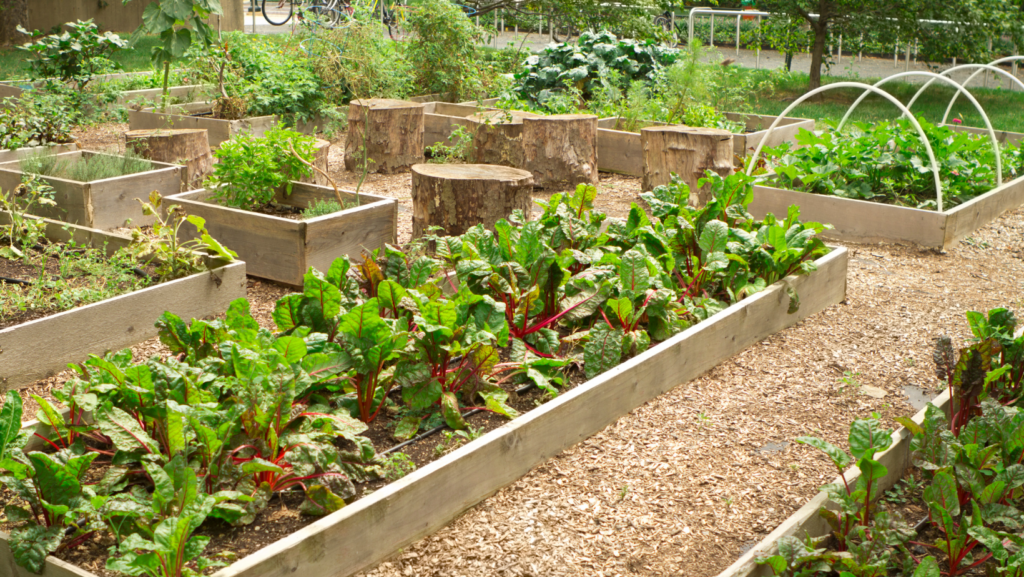Urban gardening is transforming city landscapes and the way residents interact with their environment. Amidst concrete jungles, these green spaces are not just a feast for the eyes but also a boon to well-being. As cities grow denser, the value of these small patches of greenery becomes increasingly apparent, offering a breath of fresh air quite literally.
What Are Some Benefits Related To Urban Gardening?
 Urban gardening boosts air quality by increasing the volume of plants in city environments. Through the process of photosynthesis, these plants absorb carbon dioxide and release oxygen, thereby improving the overall air quality. Moreover, vegetation in urban gardens helps to reduce the urban heat island effect. This phenomenon occurs when city areas become significantly warmer than their rural surroundings due to human activities. The plants cool their surroundings by providing shade and releasing moisture into the air.
Urban gardening boosts air quality by increasing the volume of plants in city environments. Through the process of photosynthesis, these plants absorb carbon dioxide and release oxygen, thereby improving the overall air quality. Moreover, vegetation in urban gardens helps to reduce the urban heat island effect. This phenomenon occurs when city areas become significantly warmer than their rural surroundings due to human activities. The plants cool their surroundings by providing shade and releasing moisture into the air.
Additionally, urban gardens contribute to biodiversity by creating habitats for various species. In cities where natural landscapes are limited, these gardens serve as crucial refuges for insects, birds, and other wildlife, facilitating an increase in local biodiversity. These green spaces also manage stormwater effectively. They absorb rainwater, which helps to reduce runoff and mitigate flooding, a common issue in concrete-heavy urban areas. This not only prevents waterlogging but also decreases the strain on urban sewer systems during heavy rains.
Social Benefits
 Urban gardening fosters strong community bonds, enhances social interactions, and improves the quality of life. By providing shared spaces for gardening activities, residents engage more frequently, strengthening community connections. These gardens often serve as venues for educational workshops and cultural events, promoting inclusivity and cultural exchange. Additionally, they offer a sense of achievement and empowerment to individuals who contribute to the beautification and productivity of their neighborhoods. Urban gardens also support mental health by offering a tranquil escape from the bustling city life, which fosters a strong sense of community well-being. Through these activities, urban gardening becomes a powerful tool for social engagement and community building.
Urban gardening fosters strong community bonds, enhances social interactions, and improves the quality of life. By providing shared spaces for gardening activities, residents engage more frequently, strengthening community connections. These gardens often serve as venues for educational workshops and cultural events, promoting inclusivity and cultural exchange. Additionally, they offer a sense of achievement and empowerment to individuals who contribute to the beautification and productivity of their neighborhoods. Urban gardens also support mental health by offering a tranquil escape from the bustling city life, which fosters a strong sense of community well-being. Through these activities, urban gardening becomes a powerful tool for social engagement and community building.
Health and Wellness Improvements
Urban gardening significantly enhances health and wellness among city dwellers. Participating in urban gardens provides physical activity, which is key in preventing obesity and reducing the risk of chronic diseases such as heart disease and diabetes. Additionally, the availability of fresh produce increases nutritional intake, promoting better overall health. Gardens in urban areas also contribute to mental health by offering residents a therapeutic escape from urban stressors. They present a calming environment which helps in reducing symptoms of anxiety and depression. Exposure to green spaces has been linked to improved concentration, enhanced mood, and reduced mental fatigue. Thus, urban gardens not only foster physical and nutritional health but also support psychological well-being and cognitive function.
Economic Advantages
 Urban gardening contributes significantly to economic savings, both for individual gardeners and the broader community. Individuals save money by growing their own vegetables and fruits, which reduces the need for store-bought produce. On average, a well-maintained garden can yield significant returns on investment compared to the initial costs of seeds and materials.
Urban gardening contributes significantly to economic savings, both for individual gardeners and the broader community. Individuals save money by growing their own vegetables and fruits, which reduces the need for store-bought produce. On average, a well-maintained garden can yield significant returns on investment compared to the initial costs of seeds and materials.
For communities, urban gardens enhance property values and attract tourism. Properties with garden spaces or those near community gardens often have higher real estate values. Moreover, these green spaces attract visitors looking for leisure activities, which boosts local businesses and generates revenue for the city.
Furthermore, urban gardens can contribute to job creation in areas such as garden management, education, and horticulture services. These jobs not only help reduce unemployment but also promote sustainable practices within the community. Additionally, urban farms often encourage the development of related businesses, from local nurseries to restaurants that source locally-grown ingredients, creating economic growth and increasing the city’s attractiveness as a place to live and work.
Potential for Local Business Growth
Urban gardening not only revitalizes city environments but also opens doors for local economic development. By fostering local businesses related to gardening supplies, educational programs, and eco-tourism, these green spaces become more than just plots of land—they transform into hubs of economic activity. The growth in property values and the attraction of tourists to these verdant urban oases further underline the economic impact of urban gardens. They’re proving to be invaluable assets in urban landscapes, enhancing not just the ecological and social fabric of cities but also their economic vitality.

